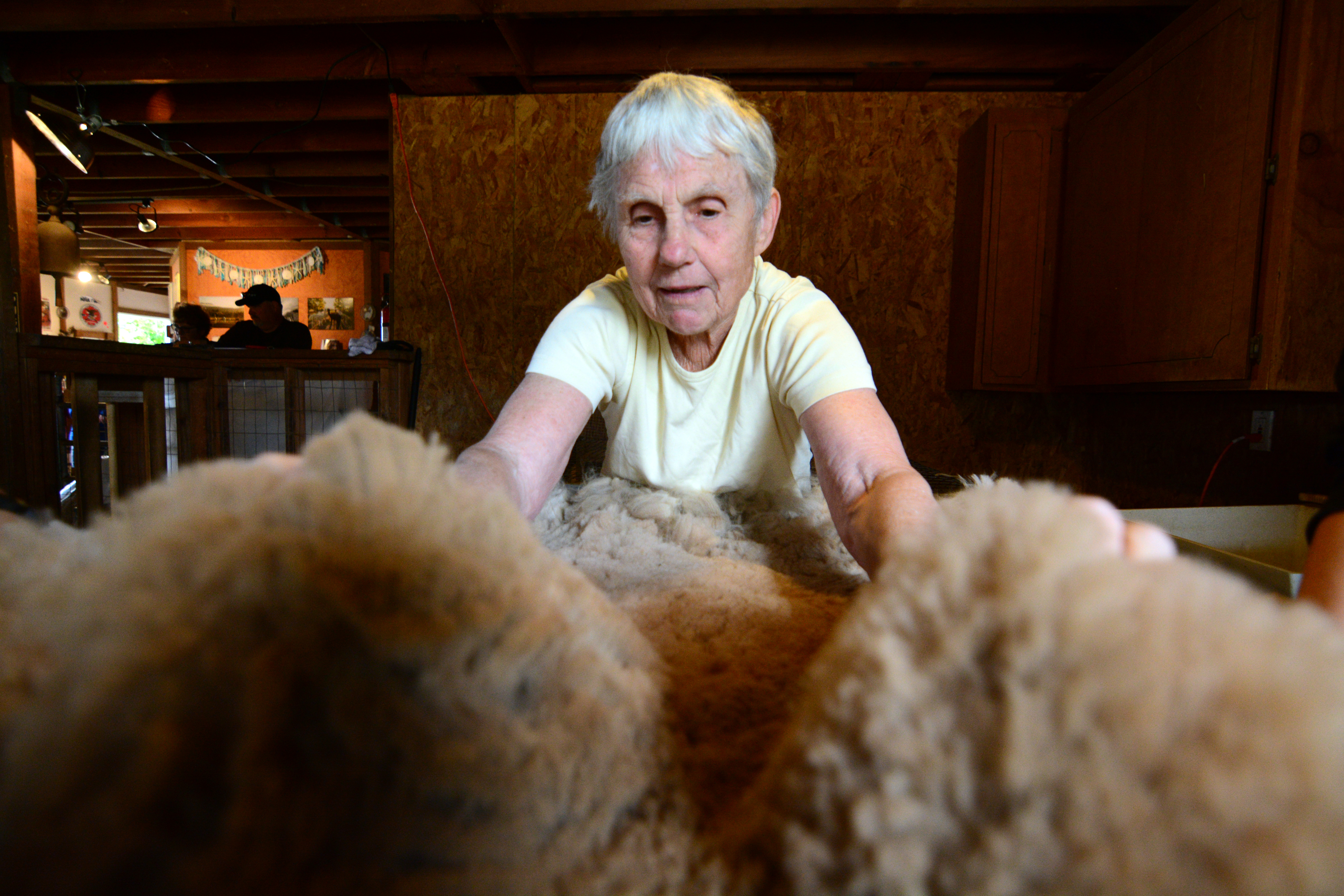SEQUIM — The third annual Dyefeltorspin festival offered a unique opportunity for the public to see alpacas shorn and the process of turning their fleece into yarn and clothes over the weekend.
Dyefeltorspin celebrates the fiber industry at Mike and Linda Gooch’s Happy Valley Alpaca Ranch, which hosted the event Saturday and Sunday.
Like last year, the event focused on fiber arts, with artisans from Clallam and Jefferson counties demonstrating how to take fleece — and even hair from dogs and rabbits — and turn it into wearables from head to foot.
During the event Sunday, alpacas were shorn and volunteers helped clean the fleece of hay, dirt and guard hairs so it could be spun into yarn.
Among the volunteers handpicking the fleece clean was Anne Olson of Seattle, who said she has spun wool for many years.
“After this process, it either gets done mechanically or done by hand . . . then it gets spun, then it gets knitted,” Olson said while picking through the fleece. “This is quite the process of going from the animal to the final product.”
That final product is much different than anything made with the wool from sheep.
Alpaca fiber is much thinner than sheep wool, is much warmer per pound and makes incredibly soft yarn, Olson said.
“They are two different types of fiber,” she said. “They are quite different and both wonderful.”
Olson said that in cleaning out the fiber, it was obvious that shearer Franc Winkley was skilled in shearing the alpacas.
“He is incredible,” she said. “If he cuts twice in one place, you’ll come out with lumps of fiber.”
They found very few lumps when going through the fiber.
With some help from others who held down the alpacas, Winkley sheared their coats in front of an audience learning about the process.
Winkley of Battle Ground is a shearer for Premium Harvest Shearing.
He started shearing saddle area of the alpacas — what is considered the highest quality fiber — then moved to their necks and other areas on the animals.
“The main blanket area is typically considered your number one,” he said, adding that the fleece with the thinnest fibers is the best quality. “Then there’s seconds.”
After that, he trimmed the alpacas for aesthetics and for their comfort.
He didn’t shear their legs, leaving fiber to prevent bugs from getting to their limbs.
Winkley said he appreciates Mike and Linda Gooch for opening their Alpaca ranch to the public and exposing people to the process.
“They do such a phenomenal job here. They have an excellent desire to bring the public to knowledge as to what they do here,” he said. “The whole setup is just perfect for the public to come in and have the capability to examine and experience it.”
Many people are still unaware of alpacas and what they offer, he said.
“What it comes down to is that anything you can think of that is wool, the alpaca fiber can be made into that product line,” he said. “What you’re dealing with is a softer feel, the insulating aspect of the fiber is at times warmer. It regulates temperature as opposed to making it hot.”
What drives the Gooches to have these public events is to expose more people to agriculture, Mike said.
“There’s a lot of younger people and older . . . that probably enjoy this lifestyle or agriculture in general, but just haven’t really been exposed to it,” he said.
The ranch has 18 alpacas and a 20-year-old llama named Willy Wonka.
The Gooches have been raising and breeding alpacas for their softly sumptuous and cold-resistant fleece for the past 19 years.
After shearing, the Gooches send their alpacas’ fleece to a processor, which returns it washed, ready for their favorite spinners.
About 65 percent of the inventory in their shop is locally handmade, and their goal is to make that 100 percent.
For those who missed Dyefeltorspin, free tours are available daily by calling 360-681-0948.
________
Reporter Jesse Major can be reached at 360-452-2345, ext. 56250, or at jmajor@peninsuladailynews.com.

